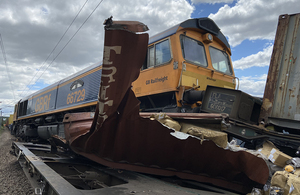Report 08/2023: Collision between two freight trains at Loversall Carr Junction
RAIB has today released its report into a collision between two freight trains at Loversall Carr Junction, Doncaster, 5 July 2022.

Train 4E11 following the collision.
Summary
At around 06:21 hrs on Tuesday 5 July 2022, freight train 4E11 passed a signal at danger and collided with the rear of a stationary freight train.
Train 4E11 was travelling from Felixstowe to Masborough (a freight terminal near Rotherham) and comprised a diesel-electric locomotive and 35 wagons. Train 4E11 had left the East Coast Main Line at Loversall Carr Junction near Doncaster and was travelling at 48 mph (77 km/h) when it passed D197 signal. D197 was at red (danger) to protect a second freight train, 4E82, which was standing in the section ahead. Train 4E11 struck 4E82 while travelling at approximately 28 mph (45 km/h).
The driver of 4E11 was taken to hospital as a precaution and was discharged later that same day. The driver of 4E82 did not sustain any injuries. The collision caused significant damage to the infrastructure, the leading locomotive and wagons of 4E11 and the rear wagons of 4E82. The route remained closed for 26 days for recovery and track repair work.
The accident occurred because the driver did not control the speed of train 4E11 to enable it to stop at signal D197. This was because the driver had experienced a loss of awareness of the driving task, probably due to the effects of fatigue. It is also possible that the driver’s awareness was affected by their low workload before the train approached Loversall Carr Junction, and by their expectation, based on previous experience, of the aspect which signal D197 would be showing.
RAIB found that the driver’s working pattern was likely to cause fatigue, and they had experienced a low quality of rest, primarily caused by an undiagnosed sleep condition. The management systems of their employer, the freight operating company GB Railfreight (GBRf), had not detected that the driver was at risk of fatigue.
RAIB also found that the engineered systems in place on the railway infrastructure and on the train did not mitigate the driver’s loss of awareness.
Underlying factors to the accident were the management of fatigue by GBRf which did not follow current industry good practice. GBRf’s risk assessment processes also did not identify the hazards created by a driver driving while being fatigued.
Recommendations
RAIB has made two recommendations. The first is addressed to GBRf to reduce the risk of train driver fatigue, including improving risk assessments, processes and following industry good practice. The second is addressed to the Rail Safety and Standards Board, working in conjunction with freight and other train operators, to include the identification of sleep disorder indicators in current standards for safety-critical medical assessments. A recommendation on the detection of driver attention loss has not been made because a previous recommendation on this issue made as a result of the Kirkby investigation (RAIB report 07/2022) is less than a year old and is still being considered by the rail industry.
RAIB has also identified a learning point to remind train drivers of the importance and meaning of flashing yellow signals.
Andrew Hall, Chief Inspector of Rail Accidents said:
Fatigue in the rail freight industry is a known risk. The nature of freight train driving, often undertaken at night, means that careful fatigue risk management is crucial for maintaining safety.
Unfortunately, this accident occurred because the driver experienced a loss of awareness of the driving task while probably fatigued. The assessment processes in place did not identify that the working pattern of the driver placed them at greater risk of suffering fatigue.
Previous RAIB investigations into fatigue-related incidents have led to the development of good practice and guidance for managing fatigue within the rail industry. If we are to avoid such incidents in future, it is particularly important that freight operators access the guidance available to them and use it to effectively manage the risk of fatigue.
Notes to editors
-
The sole purpose of RAIB investigations is to prevent future accidents and incidents and improve railway safety. RAIB does not establish blame, liability or carry out prosecutions.
-
RAIB operates, as far as possible, in an open and transparent manner. While our investigations are completely independent of the railway industry, we do maintain close liaison with railway companies and if we discover matters that may affect the safety of the railway, we make sure that information about them is circulated to the right people as soon as possible, and certainly long before publication of our final report.
-
For media enquiries, please call 01932 440015.